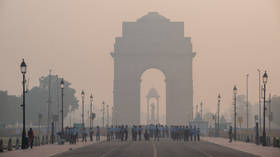Indian capital hit by ‘severe’ smog as winter arrives

India’s capital New Delhi has been engulfed in smog for a second consecutive day as the air quality in several parts of the densely populated city, estimated at some 35 million, remained in the ‘severe’ category on Friday. The dangerous readings were recorded a day after the air quality index (AQI) hit dangerous levels for the first time this winter season.
New Delhi registered an AQI of 466, according to data published by the Central Pollution Control Board on Friday morning. An AQI above 400 is considered ‘severe’. It can affect healthy people and seriously impact those with existing diseases, India’s pollution board has warned.
On Friday, monitoring firm IQAir reported that levels of the most dangerous air particles, PM2.5, which can enter the bloodstream, were almost 35 times the daily maximum recommended by the World Health Organization.
As air quality plummeted in several parts of Delhi on Thursday, the state’s chief minister Arvind Kejriwal said all primary schools would remain closed for the next two days. Meanwhile, the Commission for Air Quality Management has banned non-essential construction activities and imposed restrictions on certain categories of vehicles in Delhi as part of its action plan to tackle the situation. Those found operating the ‘banned’ vehicles in affected areas of the city would be slapped with a hefty fine.
In a video posted by the news agency ANI, Municipal Corporation of Delhi (MCD) personnel were seen sprinkling water in the Lodi Road area amid efforts to curb the pollution and restore visibility. The Indian media has attributed New Delhi’s rising pollution levels to “low wind speed” and “intrusion of smoke from stubble burning.” Indian farmers typically torch stubble, the agricultural waste left over from the October harvest, at this time of the year.
#WATCH | The Latest ANI drone camera footage from Narela, shot at 12.20 p.m. today, shows the city shrouded in a thick blanket of haze. The air quality in Delhi is in 'Severe' category today as per CPCB (Central Pollution Control Board). pic.twitter.com/PHau1e9utf
— ANI (@ANI) November 3, 2023
The development comes in the lead-up to the Indian festival of Diwali, where revelers light lamps and detonate firecrackers. This year, however, the New Delhi government has banned firecrackers with the aim of keeping pollution levels in check. The ban includes the manufacturing, storage, detonation, and sale of all types of firecrackers, including green firecrackers, until January 1, 2024.
Of course, air quality has been a major concern for India’s capital, particularly during the winter season, when the city of 20 million people gets covered with thick smog, limiting visibility and exposing residents to various health hazards.
The Indian capital is the most-polluted megacity in the world; pollution levels are 25 times above WHO guidelines, according to a study conducted by the University of Chicago earlier this year. The research warned that residents’ lives may be cut short by 12 years due to poor air quality. It identified India as the country facing “the greatest health burden” as a result of air pollution due to the large number of people affected by its high particulate pollution concentrations.












